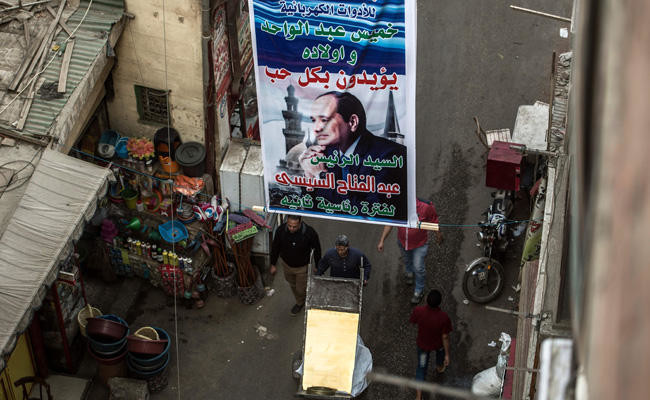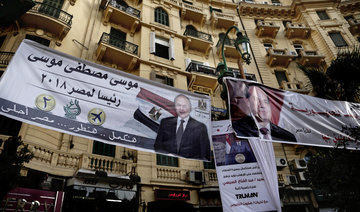CAIRO: Teacher Abdelrahman Ali wonders if he will be able to afford diapers for the second child his wife is expecting. He can no longer put meat on the dinner table and has to borrow money from his mother-in-law as hard times bite in Egypt.
Ali and other middle class Egyptians — the social backbone of successive governments — are bracing for more hardship after an election next week. President Abdel Fattah El-Sisi is widely expected to win a second term.
“With our first pregnancy, we bought all we needed to prepare ... but this time around, we’re leaving it in the hands of God. It’s very difficult,” said Ali, who teaches Arabic at a private school.
El-Sisi’s only challenger in the election leads a party that has expressed support for the president, while other candidates have dropped out, complaining of intimidation. The election commission has promised a free and fair vote.
El-Sisi has repeatedly urged Egyptians to be patient and make sacrifices for their country while the economy recovers. But political analysts say he has to be careful in dealing with the middle class, whose savings have been devoured by skyrocketing prices during his four years in office.
It was the middle class that invaded Cairo’s Tahrir Square in 2011, triggering the protests that toppled President Hosni Mubarak.
Middle-income Egyptians also staged mass demonstrations that ended with the army, led by El-Sisi, toppling Muslim Brotherhood President Mohamed Mursi in 2013.
Their votes then helped El-Sisi become president the following year, but his popularity has waned.
Reforms
Faced with the need to fix Egypt’s public finances, El-Sisi agreed to economic reforms under a $12 billion International Monetary Fund loan package.
Egypt floated the pound in November 2016, and the currency lost half its value, pushing inflation to record highs over 30 percent last summer as energy prices soared. That compared with an increase in wages of about 15 to 20 percent over the past year, according to economists.
People like Ali, who could once afford a car and vacations abroad, are still having to cut costs and manage one financial crisis after another as they become ever poorer.
His family’s combined income of 4,000 pounds ($228) a month will amount to 33 pounds per day per person when his second child is born — less than $2.
Beef is too expensive and the only chicken Ali can afford is inedible. “After it was boiled, the chicken would turn blue,” he said. “We bought it once and were scared to buy it again.”
No signs
Since Egypt signed the IMF agreement and introduced reforms, foreign reserves have doubled, foreign investment has slowly returned and economic growth begun to recover.
IMF and World Bank economists praised the government for the reforms and for shielding the poorest from the fallout, but that has not helped middle-income Egyptians.
A simple home repair can cost Ali’s family more than half its monthly income.
“The hardest thing at the moment is when something happens at home, suddenly, like a problem with plumbing,” said Ali. “In that case, I have to borrow money to fix it.”
Shopping also has it problems.
“When I used to go to the nearby market with 50 pounds, I’d buy everything I needed, and they could last maybe two to three weeks. But now I take 150 pounds and spend it and feel like I didn’t buy anything,” Ali said.
There are no signs that the middle class is about to stage demonstrations, but some analysts say El-Sisi’s government knows current conditions could push people onto the streets again.
“While I doubt the middle class will protest in large numbers in the near future, their main grievance that would drive them to do so would be economic hardship,” said Timothy Kaldas, non-resident fellow at the Tahrir Institute for Middle East Policy.
El-Sisi has promised that cuts in state subsidies will help revive the economy, promote long-term growth and attract foreign investment. But that comes with a price.
“As with any austerity package, things are expected to get worse before they get better,” said Amr Adly, a researcher with the Middle East Directions Programme at the European University Institute.
“The IMF will remain in charge of Egypt’s economic policies for the coming four to five years.”
No relief is in sight for Ali and his relatives.
The family used savings to invest in a small videogame lounge that generated some cash. But as austerity started to bite last year, they had to shut down the business because customers could no longer afford to visit.
“I had four playstations and six or eight computers and a pool table. I sold everything two months before things became expensive, so I lost a lot of money,” said Ali.
“We’ve had to give up a lot of things. You know things — what does El-Sisi call them? Luxury,” said Ali’s wife Sarah, who works at a nursery school.
“Like we used to buy certain shampoos or oils. These were specific things that I can no longer afford.”
Ali is paying scant attention to an election with only one serious candidate. He worries more that soaring prices mean his second child will have to be less pampered than the first.
A pack of diapers for their daughter Talia cost 57 Egyptian pounds when she was born two years ago. Now, with the new baby imminent, the price is 135 pounds ($7.68).
“If it’s a girl, she can take Talia’s clothes,” said Ali.
























